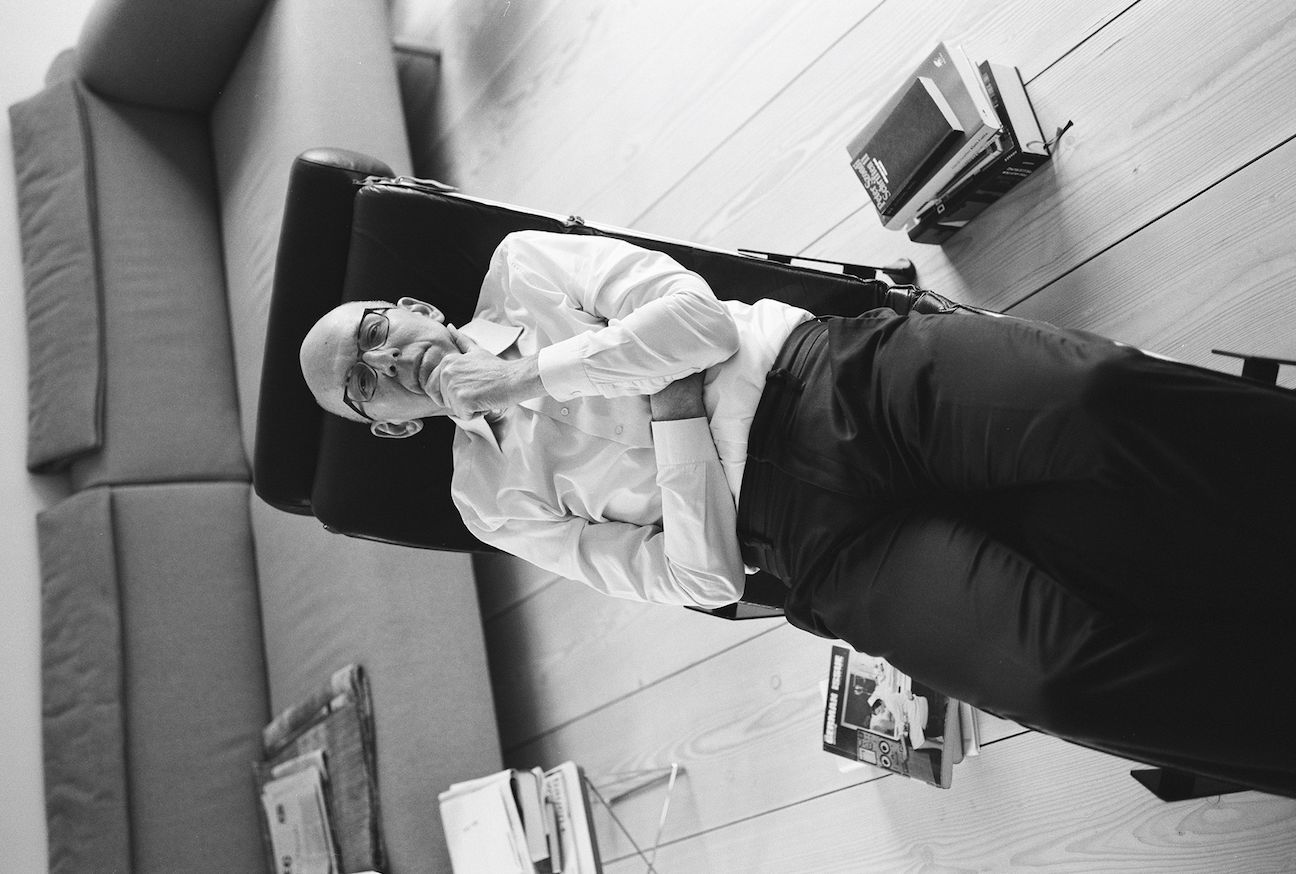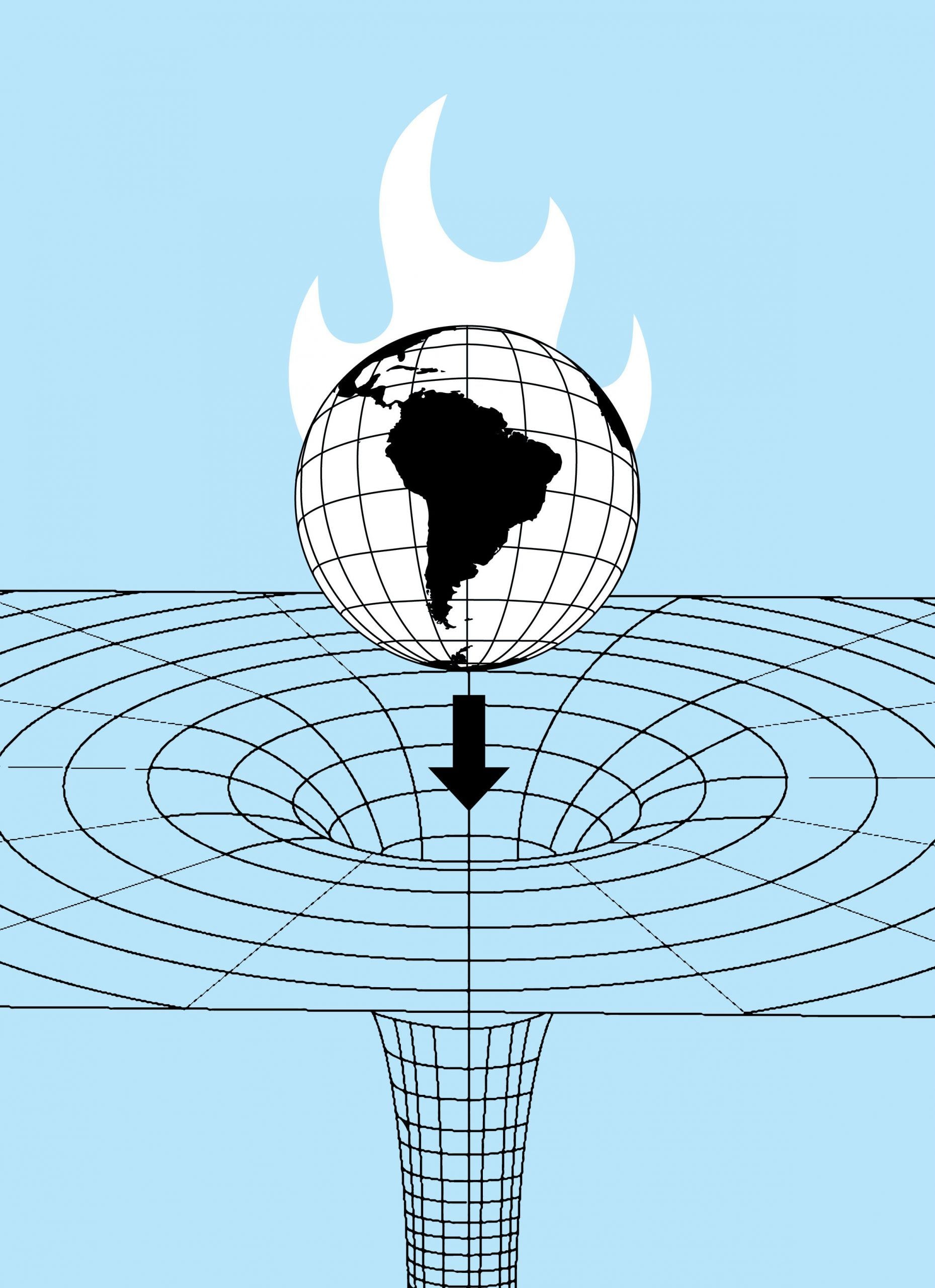“Solidarity is the Only Remedy for Embitterment”: Interview With HEINZ BUDE
|Joachim Bessing

Unless you’re living in a cave, you’ve probably seen Greta Thunberg’s speech at the United Nations. It’s hard not to feel freaked out after watching the young activist – but what happens next? Take a deep dive into the crises of the contemporary with this conversation between journalist Joachim Bessing and sociologist Heinz Bude from 032c Issue #36, where they discuss self-care during the death throes of neoliberalism, the desperate need for new forms of solidarity, and the political limitations of Thunberg’s panic.
I met Heinz Bude in his apartment, on a small lake far out in the east of Berlin, to talk about his latest book on the future of the “big idea” of solidarity. The sociologist, author, and University of Kassel professor is said to develop his books from his unscripted lectures, which perhaps explains the lively yet penetrating tone of his work – a spirit that infiltrated our conversation as well. Solidarität: Die Zukunft einer große Idee (Solidarity: The future of a big idea, Munich: Hanser, 2019) deals with our society’s deep longing for solidarity, which at present is “serviced by the right and abandoned by the left.” For Bude, an examination of the imminent end of neoliberalism, the current resurgence of fascist discourse, and the realities of present day Europe is key to the rediscovery of unified purpose on the left – a global necessity today.
Joachim Bessing: I would like to pick up where we left off almost two years ago, when we spoke about Angela Merkel at the height of the so-called refugee crisis. Famously, the Chancellor had said, “We can do this.” Was this what lead you to start thinking about the idea of solidarity?
Heinz Bude: No. It was rather that I had the impression that solidarity was the topic of the hour, because the typologies we’re now dealing with everywhere – from Brexit to the Yellow Vest movement, from Viktor Orbán to Donald Trump – are all forms of the search for a rebellious “we” that creates itself in a mode of solidarity. So the impetus of my book is as follows: the solidarity of the right has no serious opposition. The book responds to the sense of helplessness experienced by the enlightened left, and seeks to oppose this strong right-wing solidarity with something other than accusations of racism and illiberalism. In principle, the problem facing the left side of the political spectrum is the belief that at some point everyone simply came to liberalism on their own – when in fact, the idea came from Bill Clinton and Tony Blair.
Gerhard Schröder, too.
Of course, Schröder! And it was a good thing, I think. But then you somehow notice that you’ve been sucked in by this belief in liberalism and have lost a politically uncertain majority of the population. It’s coming to an end right now, before our eyes. Solidarity is the theme of the downfall of neoliberalism. That’s what interested me. Because those who will actually have to face what comes after neoliberalism will never be able to grasp this phenomenon. Nor will they be able to throw enough weight behind a concept to seriously confront the right wing. It was important to me to develop a meaningful and existentially demanding concept of solidarity in order to really confront the right.
For me, the book has Christian overtones. It’s principally about loving thy neighbor.
In a way, you’re right. There is a passage where I explicitly oppose the Buddha-like attempt at self-rescue that takes place in the name of “awareness.” I believe that the notion of “mindfulness” has become an escapist idea for the middle and upper classes – who are ultimately what matters when you want to preserve or change something. Behind this spiritualism is the idea that we live in a world that we can’t really understand, that has something absurd about it, and the answer is to develop techniques for myself, so I won’t be so touched by the world anymore.
Mindfulness. Yoga.
All of it. But it’s deep, it’s not just a surface phenomenon. It resonates in the success of the home and garden industry, with the magazine Landlust, with the store Manufactum, with books like The Secret Life of Trees. But I don’t want to denounce it at all. I believe there is an anthropological tendency to seek states of inner composure. But the big question is whether I interpret this path to inner peace as a type of world neutralization, or as a way of making myself somehow tangible. The second way is the Jesus way. And I prefer that to the Buddha way. Because my whole idea of solidarity is that we can no longer refer to collectivity in the same way that Marx and Engels could. They still saw a collectivity of the exploited and the oppressed.
Workers of the world, unite.
That’s it. And the feeling that we are workers of the world means that proletarians are all exploited and oppressed everywhere.
Something that has emerged recently is the concept of the service proletariat – DHL messengers, Foodora drivers, Amazon fulfillment packers, Facebook post reviewers. They are the exploited ones. The terms and conditions are designed to squeeze the workers out like lemons.
But here’s the problem: those are just the people with the lousy jobs. At the same time in the last 20 or 30 years a lot of people have come into lovely jobs. In Berlin there are plenty of people with lovely jobs. Some are paid well, some not so well. And there is no solidarity between these two groups in the sense of a collective consciousness. They have nothing to do with each other in terms of their experience and world view. This is called polarization.
The programmer, who maybe lives as a global nomad, settles down here and there in Airbnb apartments, orders his meals from the Foodora slave “to save time,” and has no idea what to do when he is handed the goods because he ordered and paid online and has no cash for a tip.
And this is just the beginning. Polarization will become even more significant. What I have concluded from this is that one cannot justify a concept of solidarity in relation to an “all-for-one” experience of reality anymore. Hence my idea that a concept of solidarity can only be gained through the self. That is a complicated path. Because then you get into questions of religious and ethical convictions. That’s why Albert Camus is so important to me: what’s worth living for? Is it worth living only to become an egotist? Someone who gets everything delivered and likes to watch series, sometimes picks up a volume of poetry but otherwise only strives to preserve himself?
Who at the same time practices self-sacrifice because he only rents and leases everything.
Right. One of the underlying polemics in the book is against exit capitalism. Namely against these people who say, “I’ll use the system as long as it benefits me, and then I’ll act like I have nothing to do with it anymore. Great, I’ll work until I’m 45 – maybe four times a week at a daily rate of 2000 euros – I’ll put some money away, and then I’ll stop and take the kids on a trip around the world.”
Entire companies are founded on this premise. The startup often exists to build the business and then sell it. I find the dishonest culture of many startups interesting: in the beginning, everyone has to volunteer for self-exploitation, for bootstrapping, because everyone there is “burning with passion about a common idea.” When enough profit has been accumulated, suddenly no one burns for it anymore, because that beautiful shared cause is about to be sold.
We all know now that this is empty posturing. Some time ago I was at a presidential function – something about how to make our society better. There was a young woman there who told me about a start-up association she was a part of. They were all fired up about changing the world together and so on. I kept my distance and thought to myself, “We get it – she really doesn’t have to go on about this right now.” I think that’s the general feeling. No one wants to listen to that anymore.
There is a new entrepreneur with an app called OHlala, which is supposed to make it possible for anyone to become a sex worker. Just like Tinder, only with women’s pay. She’s also passionate about her idea.
Let’s shed some light on this. All of this is an irrational running away from the truth of life. My book on neoliberalism is called Gesellschaft der Angst (Society of Fear, Hamburg: Hamburger Edition, 2014). With the realization that at the bottom of a strong “we” lies a very fragile ego, always on the brink of depressive exhaustion. The truth of this vulnerable ego is actually the truth of solidarity: that’s the only way you come to others or get to the idea that we might be able to build a decent life together. For example, to the idea that the people who bring you your snacks should be paid decently, that one should have an antenna for that.
This brings us back to religion – because that’s where these rules for a decent life are laid down. Politics doesn’t tell me anything about that.
Well, if we’re talking about Germany, it’s pretty clear that everyone is actually relieved that Angela Merkel’s time is coming to an end. We’re waiting for her to leave the stage.
The last time we spoke, we were wondering who might inherit it. You said that Merkel’s party was questioning that quite a bit as well.
It’s still pretty unclear, I guess. But I believe it’s possible to win majorities by offering an ambitious, existential policy. One that also asks for something from the people – and not just their money. It’s about a demand for purpose – that’s what you have to ask for. You can’t say that purpose or meaning is a private matter. You have to make that proposition, by saying, “I challenge you, citizens, to express yourself about your commitments.” You know, life isn’t just about options!
I find it humiliating how rare it is to see intellectually demanding political statements in Germany.
You are right that we are essentially fluffing our political vocabulary. We’ve made it a lifestyle vocabulary, with strange definitions – for example in its opposition to illiberalism, and so on. This, I believe, is one of the problems that will be highlighted when it becomes even clearer for people that this extraordinary boom of the last ten years – which was a global economic boom, but Germany profited most – is coming to an end. The time for fair-weather policy is over. Things are about to become more serious. Which solidarity, which principles of justice, do we want to stand for?
I brought you the front page of today’s Frankfurter Allgemeine Zeitung newspaper. Under a photo of Angela Merkel with the Irish Prime Minister the line reads, “Angela Merkel has assured Germany’s solidarity with Ireland.” What does the Chancellor’s solidarity mean here?
Very interesting question. What does solidarity mean in Europe today? I believe that we’re facing our moment of truth, and the truth is: in Europe, we don’t always get along as well as we like to think we do. This became clear with the Brexit vote. When I discussed Brexit with a group of parliamentarians and intellectuals from Great Britain, that’s when I grasped it: I really don’t understand them. My only explanation was that they must be crazy. Yet somehow that isn’t right either. We have held Europe together for a long time around a fiction of understanding. That’s the moment of truth: we do not understand each other at all. These are good conditions for solidarity. There is no template for solidarity called the European Union. It’s still undefined. Now we have to talk about it again with respect to reciprocity, we have to mutually look each other in the eye and say, “I do not understand you.” And then, “How are we supposed to move forward?” That’s a good way to get back to Europe.
In the book you write that solidarity means asking the other, “What do you need?”
Isn’t that a beautiful question, Europe? Say it seriously, dear Brits: “What do you need?” Say it seriously, dear Greeks: “What do you need?” And don’t tell us what you want, tell us what you really need. That would be a discourse of solidarity. The insolubility of Brexit is also due to the fact that we have so many people in Brussels who are attached to the EU. The EU is not the only possibility for Europe. Solidarity means, for example, this solidarity of shared truth that whatever happens, things cannot go on like this.
So to summarize, you want something extreme. You want politics to go into a conclave.
Yes.
And work against the forward-motion bias in world affairs that says we always have to be in high gear. Instead, we have to stop running the shop, withdraw, and develop new ideas. Actually this might have benefited the banking crisis in 2008.
Yes, of course. Under the surface, this book is also an aversion to the metaphysical problems of neoliberalism. They consist above all in the idea that the world is the result of my vote. According to this view the world doesn’t exist or progress on its own. And that is fundamentally wrong.
As FDP party leader Christian Lindner said: “There are no problems, only thorny opportunities.”
And that’s completely wrong. We must now return to a realistic epistemology – constructivist epistemology is rubbish – and do so with the idea that the world is really asking us questions. The world is coming for us. It’s not just the result of our projection. There is the very beautiful thought from Bruno Latour: the world comes to the Earth and says, “What are you really doing with us?” Earth says, “You can’t just do whatever you want with us anymore.” The Earth can’t become, can’t cope with anything without humanity anymore – hence these books about the “life of trees.” There is truth in that. Suddenly, the Earth raises its voice.
We come from a world that has always deceived itself using the notion of complexity. For many people complexity is, rightly, the formula for a lie. When people don’t want to say what something’s really like, they say, “it’s complicated.” But no one can name any of the basic problems. In my view, thinking has to become elementary again, to oppose the excuse of complexity. And solidarity leads to an elementary question: What do I allow myself to be touched by, and to what degree is another person liable? You can reject these basic questions, you can choose to be bound to no one – if you’re a social phobic. If so, that’s something you have to acknowledge: I am afraid of society. But think about it for a moment and you know that as an ego – even as a strong ego, as a creative ego – you will not achieve anything if you don’t invite others in.
This has to do with “self-care,” which seems to be the new term for “wellness.” So, it’s Friday, and on your way home there are students gathered with their placards, taking part in the “Fridays for Future” weekly student strike. How do you see it: is this a kind of love parade, an expression of youth culture? Or does it show political solidarity within a certain age group?
No. I increasingly believe that this is an expression of the fact that we have left young people extremely alone with their metaphysical needs. That is the point. The work of (16 year old Swedish climate change activist) Greta Thunberg is not unappealing to me. But it’s absurd to think it’s going to produce a Nobel Laureate, or materialize at Davos or on a federal level or with the Potsdam Climate Institute. It just reveals the problem that the search for authority ends with the adolescent who says, “Share my panic!” That is the absolute opposite of solidarity. Panic creates swarms. In panic, people flee. Solidarity arises from inner composure.
Credits
- Text: Joachim Bessing
- Photography: Christian Werner


